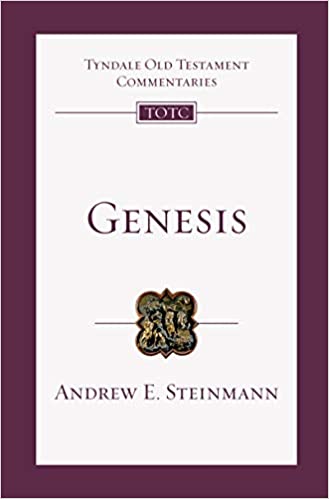A Book Review from Books At a Glance
by Ron Lindo
“The stronger the foundation, the steadier the house.” This architectural reality is a fitting illustration for many situations in life. When it comes to interpreting the Bible, how one approaches the book of Genesis generally affects how one will deal with the rest of Scripture. As Andrew Steinmann states, Genesis “serves as the foundation for the rest of the Old Testament” (p.39). Steinmann’s statement can be extended to say that Genesis is the foundation for all Scripture (see p. 2).
If the stories of Adam are simply mythical, then Paul’s arguments related to Adam’s actions seem to lose their power. If Genesis was written from documents unrelated to the time and person of Moses, then it is all the more likely that there is no theological harmony to be found within Scripture. Given the importance of Genesis for building the foundation of a robust biblical theology, conservatives require solid arguments for how Genesis fits within such a theology.
In various ways, Steinmann’s analysis delivers an evangelical response to the multiple issues found in the narratives of Genesis. He presents each problem with a nuance that does not come across as a particular basis for a specific agenda. For example, in dealing with the issue of polygamy, Steinmann does well to note that this practice continued into the times of the New Testament and that none of these marriages were illegitimate (see p. 178). However, Steinmann also balances this statement by emphasizing that God’s ideal for marriage is monogamy. In addition, Steinmann notes that many of the polygamous relationships in Scripture are described as containing elements of tension that are easily avoidable in monogamy (see p. 180). Thus, Steinmann explains the issue so that he does not shy away from its harsh realities and does not ignore how the biblical authors sought to guide their readers toward God’s ideal.
While the issue of polygamy might not be a top issue of discussion for evangelicals, Steinmann provides a similarly balanced approach to most of the other top tier topics provoked by the text of Genesis: its authorship, the historicity of the creation account, who are the actual people of God, and the first occurrence of the doctrine of justification by faith. I will discuss Steinmann’s approach to each of these briefly.
Steinmann affirms that Moses wrote most of Genesis (and the rest of the Pentateuch). He notes that the Documentary Hypothesis contains several problems that have been “pointed out for over a century by conservative scholars” and have yet to be given a proper response (p. 15). Because of this, it seems better to rely on the witness of Scripture itself which overwhelmingly suggests that Moses is the author of Genesis. While it seems clear that certain elements were added later (see p. 5, for a list of later scribal updates), Steinmann still concludes that Moses is the primary author of Genesis. Though Steinmann does not discuss some of the latest research related to J. P. Wiseman’s tablet theory, Steinmann’s comments are still helpful for dealing with fundamental issues related to the structure and authorship of Genesis.
Some affirm that the creation account borrows from other Ancient Near Eastern myths, even among evangelicals (i.e., John Walton, see p. 18). However, Steinmann writes a compelling response to this approach. The research of G. H. Johnston leads Steinmann to infer that “Genesis 1 could be viewed as refuting all Ancient Near Eastern creation myths even without direct knowledge of or reference” to many of them (p. 20). More so, Steinmann also acknowledges that there are several “compelling reasons” to understand the creation account as “depicting six actual, regular days” (p. 61).
In Gal 3:7, Paul states that those who have faith in God are the true sons of Abraham. While for some, such a statement implies that the nation of Israel was not intended to include Gentiles until after the time of Christ, Steinmann provides evidence to the contrary. He begins by noting the literary and textual connections between the name Israel (“he struggles with God”) and Jeshurun (“God has made right”) to suggest that “the term Israel is not inherently an ethnic designation, and belonging to Israel does not require a certain heritage” (p. 31). In other words, proper “sonship” is related to how one mimics the group’s faith to which they are below (see p. 354).
More so, Steinmann notes that from the very beginning, the nation of Israel included foreigners who were determined to live according to the faith of Abraham; “Such persons would have been his brothers and sisters in faith even if they were not related to him by blood” (p. 197). In conjunction, Steinmann also contends that God’s people have always been saved by being justified by God, who gives a free pardon to those who trust in him. As expected, Steinmann identifies this theological truth to be “particularly clear in the life of Abraham,” specifically Gen 15:6 (p. 32). However, following the lead of Hebrews 11, Steinmann also identifies “other persons in Genesis” who “exemplify justification through faith” (p.33). These individuals include Abel, Noah, Sarah, Isaac, Rachel, Jacob, Joseph, and Judah. Sadly, Steinmann does not further explain how most of these characters exemplified this doctrine within his commentary.
To conclude, I found Steinmann’s commentary to be a breath of fresh air given the state of modern scholarship. Though I wish Steinmann had elaborated on some elements and included others, I still find this commentary to be a helpful bridge between conservative academics and biblical interpretation. Overall, I would recommend Steinmann’s commentary to anyone interested in understanding the purpose and theology of Genesis.
Ron Lindo (PhD, New Orleans Theological Seminary) serves as an adjunct professor at New Orleans Baptist Theological Seminary and Southwestern Baptist Theological Seminary.
